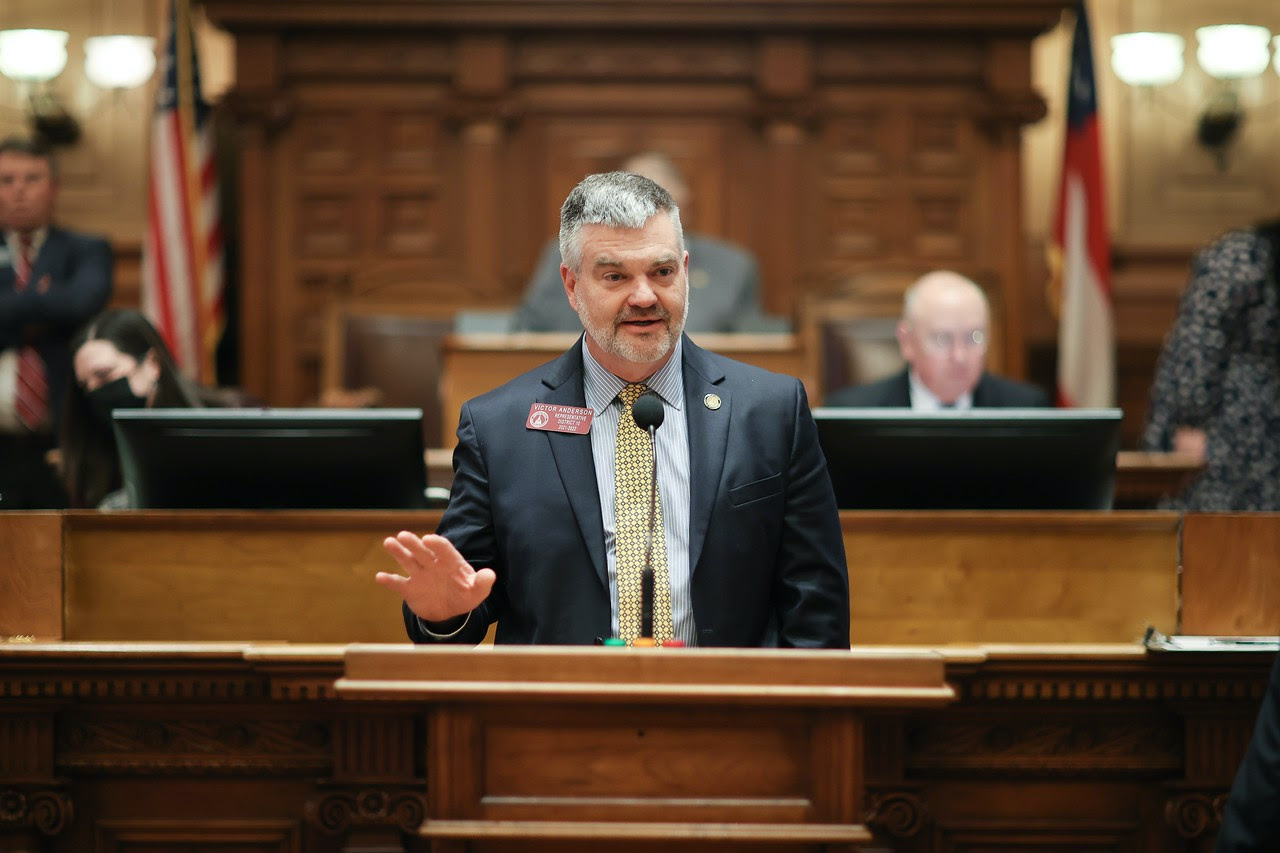
Editor’s Note: The following legislative update is from Rep. Victor Anderson (R-Cornelia) who represents the 10th State House District of Georgia. The opinions in this column are his. You may contact Rep. Anderson at victor.anderson@house.
Greetings from the Gold Dome!

As the General Assembly met for the ninth week, in the final days before our Crossover Day deadline [March 15], there were many bills moving through the House to achieve final passage. As we are in the second year of our two-year term, all bills must pass either the House or the Senate by Crossover Day in order to have a chance of making it to Governor Kemp’s desk to become law. Healthcare, rural initiatives, tax relief, and the budget were priority last week.
In closing, I humbly ask that you join us in prayer for peace and for the Ukrainian people to maintain their freedom. In solidarity with Ukraine, the House passed House Resolution 920 to strongly condemn the Russian invasion of Ukraine and call on Vladimir Putin to end this unprovoked aggression. This resolution commends Ukrainian President Volodymyr Zelenskyy and the people of Ukraine who have courageously sought to defend their nation.
As we continue to make our way through the final days of the session, the pace will only quicken as we all work to pass our sponsored legislation. If you need anything at all, please reach out to my Capitol office directly. In the meantime, be on the lookout for further updates. Thank you for privilege the of allowing me to serve as your voice under the Gold Dome. May God bless you and may He continue to bless the great state of Georgia.
House Action
Budget
The only constitutional obligation of our state legislature is to pass a balanced budget and the Georgia House spent much of last week focused on fiscal matters. House Bill 910, the Amended Fiscal Year 2022 Budget, received final passage and was sent to Governor Kemp to be signed. The AFY 2022 budget is set at a revenue estimate of $30.3 billion, which is an increase of $3.08 billion or 1.3 percent over the current budget. This increase will allow our state to provide additional funding during the current fiscal year for many of our priorities, including more than $900 million in one-time expenses for our state’s infrastructure and $950 million to provide salary increases for state employees and teachers.
We also saw the House vote on the Fiscal Year 2023 Budget, which will fund operations of state government starting on July 1. The FY 2023 budget is set at a revenue estimate of $30.2 billion, which is a $2.9 billion or 10.8 percent increase over the FY 2022 original budget, and this budget permanently restores nearly $640 million eliminated from the budget in FY 2021 during the economic uncertainty of the COVID-19 pandemic. Among the priorities funded in this ambitious bill are $65 million in new spending to support public safety and mental health services; full funding of the Quality Basic Education (QBE) formula for our K-12 public schools totaling $11.8 billion; and the Georgia Student Finance Commission received additional funding for service cancellable loans to boost recruitment and retention among key state employees including state medical examiners, National Guard members, law enforcement officers and mental health practitioners. For those of you looking for even more detail on our annual budget priorities, a comprehensive list of FY 2023 highlights from the House Budget and Research Office can be found on the Georgia General Assembly website.
Tax Reform & Relief
Even with all the budget work this week, my legislative colleagues and I acted on many other important bills. All of us are concerned by skyrocketing gasoline prices and so the House passed House Bill 304 to allow the governor to suspend the state motor fuel excise tax through the end of May 2022. This will provide some relief to Georgians paying more than ever to fuel their vehicles.
I am excited to announce the House passed House Bill 1437, or the Georgia Tax Reduction and Reform Act of 2022, to cut income taxes for Georgians starting in 2024. HB 1437 would eliminate personal income tax brackets and replace them with a single, flat rate of 5.25 percent. This legislation increases the standard exemption for Georgia’s filing income tax returns which will also boost tax savings. Proponents of this bill estimate that Georgians would save an estimated $1 billion per year when the cut goes into effect.
Healthcare
We passed an important bipartisan bill last week with House Bill 1013, or the Georgia Mental Health Parity Act, to provide comprehensive reforms for our state’s mental health care system and give Georgians struggling with mental illness the resources they need. This legislation, which has been in the making for the last three years, will provide sweeping legislative changes to help improve insurance coverage and the delivery of mental health care.
The House passed another crucial bill to improve mental health treatment and recovery programs in our state. House Bill 1069 would prohibit private adult residential mental health programs from operating in our state without a valid or provisional license, and this legislation would implement substantial penalties if these unlicensed facilities continued to operate. Outlawing unlicensed facilities will ensure Georgians admitted into these programs can be assured quality care.
Rural Initiatives
We passed two bills last week as part of our continued fight to improve access to health care throughout rural Georgia. House Bill 1042 will create a new grant program under the OneGeorgia Authority, which issues grants and loans for economic development initiatives in rural Georgia. This program will provide up to $200,000 in grant funding to eligible development authorities seeking to establish primary care, dental or mental health care medical facilities in health professional shortage areas. This crucial investment will provide the working capital needed to build much needed health care infrastructure in some of the most underserved areas of our state.
House Bill 1371 will create the Rural Health Advancement Commission, which would collaborate with educational institutions and health care facilities to address long and short-term workforce shortages in rural Georgia. Chaired by the dean of a Georgia medical college, this 13-member commission would be required to meet at least every two months to develop private-sector solutions to these shortages, and the commission would issue a report of its findings periodically to the General Assembly and the Governor. Bringing together these experts will ensure my legislative colleagues and I are brought the best proposals to keep Georgia on the cutting edge of rural health care delivery.
Bills of Interest
The Georgia House of Representatives also passed the followings bills and one resolution this week:
House Bill 274, which would require that each juvenile court judge is paid by the Council of Juvenile Court Judges with a total supplement of $6,000 in equal quarterly installments of state funds as long as the circuit has implemented a drug court division, mental health court division, family treatment court, veterans court or other alternative accountability court division;
House Bill 689, which would allow a person who committed a crime as a result of being trafficked to petition the court to seal the records of those offenses, as well as allow law enforcement agencies to review sealed records for law enforcement or criminal investigative purposes;
House Bill 725, which would revise the membership of the Council on American Indian Concerns to have at least one member representing each of the American Indian tribes identified in Georgia;
House Bill 839, which would authorize a local referendum for the creation of the city of Mableton, and this referendum would be voted on during a local special election no later than November 2022;
House Bill 849, which would add human resources personnel to the list of individuals who are required to report child abuse, and this requirement would only apply to businesses with at least five employees and that employ minors;
House Bill 884, which would require the state’s professional licensing boards to provide expedited licenses within 30 days of receiving an application and all required materials to spouses of military service members in Georgia if the spouse has an equivalent license in another state;
House Bill 895, which would restrict the disclosure of the home address, date of birth and home telephone number of a non-sworn employee of a law enforcement agency in criminal cases when the prosecuting attorney is required to disclose the witnesses who will testify at trial, and instead, the prosecution would disclose the current work location and work phone number of both the non-sworn employees and any law enforcement officers who are witnesses;
House Bill 934, which would amend Transportation Special Purpose Local Option Sales Tax (TSPLOST) laws by allowing, in intergovernmental agreements, the tax to continue until the approved timeframe has expired even if the amount of tax collected has surpassed the originally estimated amount;
House Bill 1004, which would provide for the establishment of unified campus police forces through agreements entered into by colleges and universities;
House Bill 1039, which would extend the sunset dates for earning, transferring and reporting for Class III shortline railroad tax credits;
House Bill 1040, which would require certain renewed contracts between the Georgia Department of Human Services (DHS) and community action agencies (CAA) to be executed by the CAA’s board of directors, and these contracts would only be offered by DHS if a CAA has submitted a current IRS Form 990 and audit reports to the state;
House Bill 1103, which would provide the definition of a “heavy-duty equipment motor vehicle” for fees in a motor vehicle rental agreement between a motor vehicle rental company and a rental customer;
House Bill 1193, which would require the Georgia Board of Funeral Service to allow licensees that had their license lapse for less than 10 years to be reinstated after paying the required renewal fees for the lapsed time and a reinstatement fee, and these licensees would be required to complete continuing education hours;
House Bill 1194, which would provide the annual update to the Uniform Carriers Act and update the effective date from January 1, 2021, to January 1, 2022, to comply with federal law;
House Bill 1224, which would update laws relating to the creation of county boards of equalization, duties, review of assessments and appeals by allowing a taxpayer with tangible personal property having a fair market value greater than $200,000 to appeal directly to a hearing officer;
House Bill 1232, which would allow temporary operating permits in lieu of temporary license plates in specified instances;
House Bill 1234, which would require the court to appoint an attorney for any child receiving extended care youth services from the Division of Family and Children Services;
House Bill 1279, which would allow people with a chronic disease or over the age of 65 to carry one or more prescribed medications in a certain compartmentalized container other than the original container that the medication came in, and these individuals would be required to provide the names of medication to law enforcement if requested;
House Bill 1280, which would allow Georgia’s municipalities to contract a county and its county tax commissioner to prepare the tax digest for the municipality, assess and collect municipal taxes, fees or special assessments in the same manner as county taxes, as well as invoke any remedy permitted for the collection of municipal taxes or fees; contracts would specify exact services to be provided as well as the total amount to be paid for services, among other requirements;
House Bill 1304, or the Georgia Caregivers Act, which would allow inpatients to designate caregivers to be actively involved in the patient’s discharge planning process, and the hospital would notify the caregiver of the patient’s discharge, but failure to make contact would not interfere with appropriate medical care or discharge;
House Bill 1319, which would create the Georgia Law Enforcement Officer (LEO) Service Cancelable Loan for eligible Georgia peace officers to pursue an associate or bachelor’s degree in criminal justice or related social science field, as well as create a loan forgiveness program for Georgia Bureau of Investigation medical examiners;
House Bill 1343, which would remove the requirement to include a roster of all commissioned officers in the governor’s annual report;
House Bill 1344, which would update language in Georgia’s laws related to employment discrimination of military spouses by replacing “wife” with “spouse;”
House Bill 1351, which would require the Georgia Department of Community Health to provide the pharmacy benefits for Medicaid members enrolled in a care management organization (CMO) starting July 1, 2024, and this department would be required to reduce a CMO’s contract term payment by 7.5 percent of the CMO’s net underwriting gain for the 2022-2023 contract year in order to offset costs incurred in program implementation;
House Bill 1372, which would revise the Georgia Utility Facility Protection Act to enhance the process for locate requests of underground utility facilities or infrastructure and would require 9-1-1 to be contacted if an excavator damages a gas or hazardous liquid pipeline; owners and operators of underground facilities would be required to participate in the Utilities Protection Center and all underground facilities, excluding sewer cleanouts and water meter boxes, would be required to be located within the public right-of-way and would prohibit anyone from blasting or excavating until a locate request for underground facilities has been submitted; the Department of Transportation (DOT) would be required to participate in the Utilities Protection Center to receive locate requests in DOT’s right-of-way;
House Bill 1381, which would require members of local water or sewer authorities to complete training courses on water, sewer or environmental quality programs as a prerequisite for the authority to receive specified funding;
House Bill 1383, which would provide a framework for administrative hearings of the Commission on Equal Opportunity;
House Bill 1384, which would require the Georgia Department of Community Affairs to amend state minimum standard codes to allow for the use of ungraded lumber for uninhabited structures on property zoned for either residential or agricultural use
House Bill 1385, which would require municipalities to notify the Georgia General Assembly’s Legislative and Congressional Reapportionment Office when annexing property, enlarging municipal corporation limits and annexing unincorporated islands;
House Bill 1388, which would amend Georgia’s laws concerning official legal organs, which are publications containing official legal notices;
House Bill 1391, which would set the salary of the circuit public defenders to the same salary as district attorneys, and the maximum salary for assistant public defender IVs would be raised to 95 percent of the circuit public defender salary;
House Bill 1396, which would create the Georgia Municipal Court Clerks’ Council as an state agency designed to improve municipal courts, assist municipal court staff and assist in training municipal court staff;
House Bill 1406, which would provide guidelines and requirements for local zoning decision hearings that focus on revising zoning classifications from single-family residential uses to multifamily residential uses;
House Bill 1409, which would increase the maximum amount of benefits that an employee can receive under workers’ compensation for temporary total disability to $725 per week, the maximum amount of benefits for temporary partial disability would be $483 per week, and the maximum for the surviving spouse of an employee who died from injury would increase to $290,000;
House Bill 1428, which would act as the annual clean-up bill to revise, modernize and correct errors or omissions to the Official Code of Georgia Annotated;
House Bill 1433, which would change the composition of the advisory board to the Criminal Justice Coordinating Council to include the following: representatives of programs that advocate alternatives to incarceration, licensed or certified professionals who work to address mental health and substance abuse issues in delinquent and at-risk youth and representatives of victim or witness advocacy groups with expertise in addressing sexual abuse, exploitation and trauma;
House Bill 1438, which would allow for the call of a caucus for a Georgia DOT board election to be sent via email rather than by mail, clarify language relating to contracting for public-private partnerships and alternative contracting methods, exempt the DOT from certain public disclosure requirements;
House Bill 1441, which would revise Georgia’s laws regarding private detective and security businesses by removing the requirement that licensees certified by the Georgia Peace Officer Standards and Training Council must also obtain a license to serve as a guard, watchman or patrolman;
House Bill 1452, which would change dating relationship protective orders so that the definition of “dating violence” includes those who were in a relationship within the last 12 months rather than the current six-month timeframe;
House Bill 1455, which would expand the arrest authority for Georgia Ports Authority officers in certain circumstances by giving ports officers the ability to investigate motor vehicle accidents that occur on any property under jurisdiction of the authority and on public or private property within one mile;
House Resolution 594, which would authorize the governing authority of each county, municipality, consolidated government and the board of education of each independent and county school system in Georgia to grant temporary tax relief to properties that are severely damaged or destroyed as a result of a natural disaster and that are located within a nationally declared disaster area; this resolution also includes the required ballot language to ratify this amendment.
The 10th House District currently includes portions of Habersham and White counties. Rep. Anderson serves on the House Energy, Utilities & Telecommunications Committee, Governmental Affairs Committee, and State Planning & Community Affairs Committee. He also chairs the study committee on annexation and cityhood issues.







